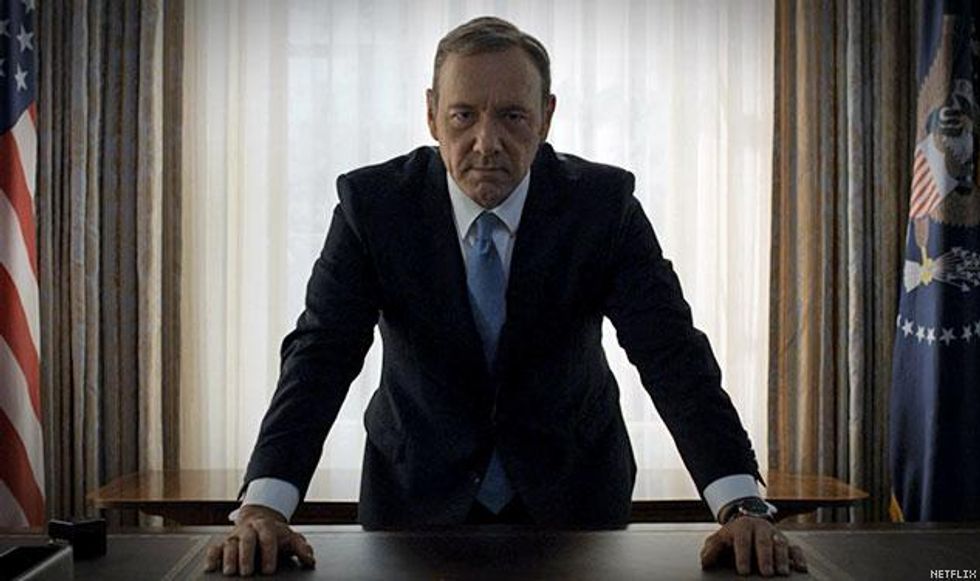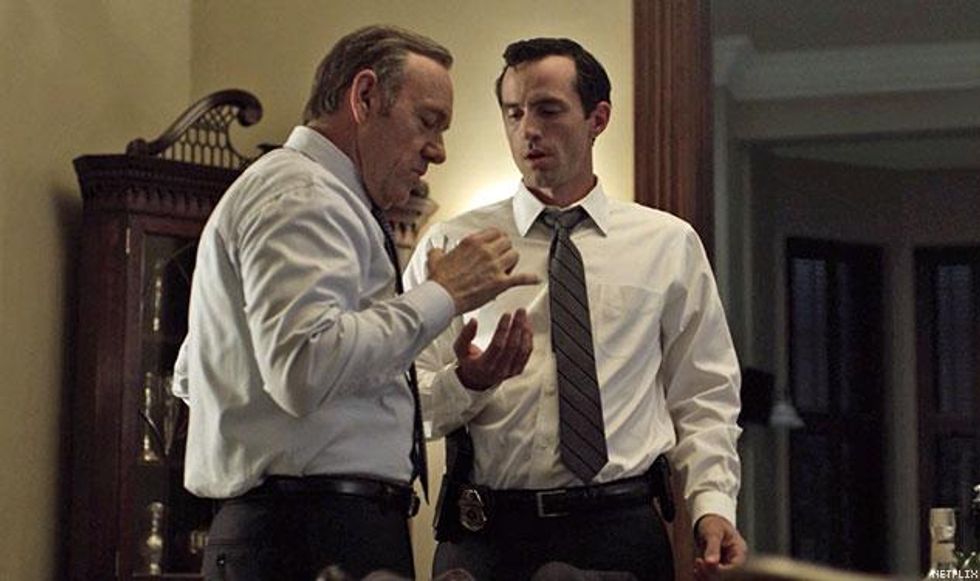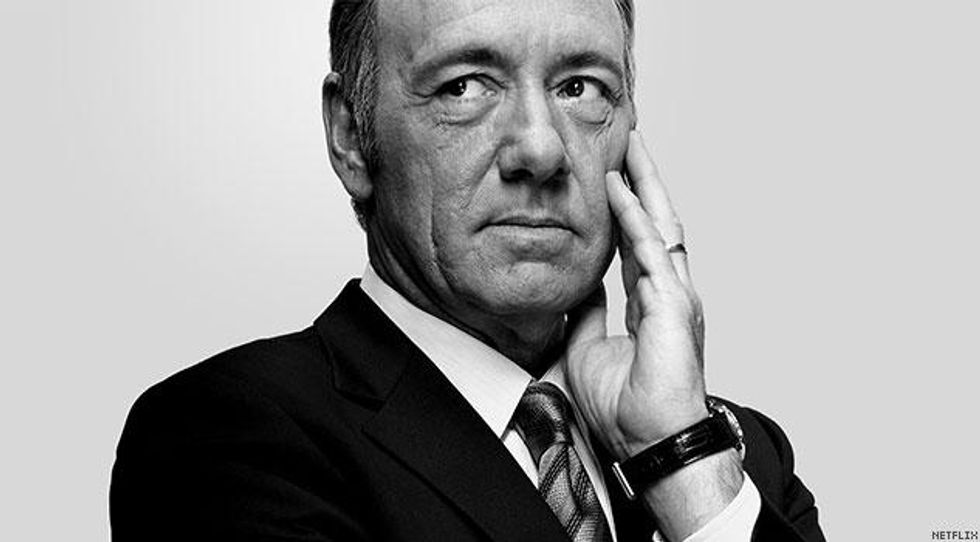Frank Underwood is not a good guy. His ruthlessness might be admirable if he weren't a manipulative politician who has clawed his way to the top using any means necessary, decade after decade. You could probably name a number of offenses he's committed as president that were grounds for impeachment (or at least losing the Democratic primary). He's got blood on his hands, both human and dog. Sadly, he's the politician many of us expect to be lurking in the Capitol, making sneaky, destructive back-room deals -- and if he's in your party, you're happy to have him, as long as his evil deeds fly completely under the radar.
But while House of Cards' Frank Underwoood is among the most watchable flawed characters on television, there's also something quite interesting about him; his sexuality. Perhaps you caught that episode in season 2 where he and Claire Underwood hooked their sensuous claws into Secret Service agent Edward Meechum. Or the one where Underwood reconnects with an old flame from his military academy days. Or the episode in season 3 where things get intimate with biographer Thomas Yates (after multiple episodes pulsating with sexual tension between the writer and the president). So what's the deal with the people Frank Underwood gets in bed with -- and I'm not talking about his political wheeling and dealing.
Hollywood loves to be progressive with its presidents. Before the real world, pretend voters have repeatedly elected a person of color or a woman in films and television: Cherry Jones as President Allison Taylor and Dennis Haysbert as President David Palmer on 24, Geena Davis as President Mackenzie Allen on Commander in Chief, Morgan Freeman as President Tom Beck in Deep Impact. It may have been inadvertent, but House of Cards finally took the next step when its writers made Kevin Spacey's Francis J. Underwood America's first bisexual president.
Perhaps Underwood wouldn't frame himself as such. But based on his history, he is.
When asked whether he consciously portrays his main character as bisexual, the show's creator Beau Willimon tells The Advocate, "I think it's an interesting thesis. ... But I think I'd prefer to let the audience experience Frank as they see fit rather than try to define who he is for them."
Well, as an audience member, and a bisexual person, I knew there was something up as soon as I saw that spark between Frank and his old military academy buddy, Tim Corbet. It was evident the second they locked eyes again after years apart. But in that moment, Underwood drops his defenses. He stops being South Carolina Rep. Frank Underwood, a conservative Democrat, and is just Frank, perhaps for the first time in the show's first season. He gets flushed. He's vulnerable and doe-eyed. Yes, this evil man is capable of having feelings toward another human; and yes, that human happens to be a man.
But not just one man. He drops his guard again with Yates, as their tension in season 3 remained palpable until that one moment in Underwood's study.
Underwood is generally impenetrable, even to the viewer as he lets us come along for the ride -- except for when it comes to his intimacy with other men. Even with the way he trusts Meechum and his dirty right-hand henchman Doug Stamper, Underwood code-switches in the company of men. But not all men. Only certain men. The right men.

Denis Dison of the Gay and Lesbian Victory Fund, an organization that helps LGBT politicians win office, says he wishes Frank were forthright about his sexuality, if he is indeed a bisexual politician.
"We would rather have a bisexual politician presented in a better light -- someone who was open about it, honest about it, and also not a murderer," Dison says with a laugh. But hey, "some murderers are bisexual. Some are gay. It's something we have to get used to. But clearly the vast majority of murderers are straight, just like the vast majority of people."
Any casual watcher of House of Cards (including those who dropped the show beyond the pilot thanks to its dark nature) knows Underwood is not a good human. Would LGBT people -- particularly bisexual people -- really be OK with claiming Underwood as one of our own?
He's an incredible fictional character but not exactly a great role model, with all that scheming, lying, and killing. After all, when any minority group is portrayed terribly on television or in movies, it stings a little extra. It's not like television has a great track record of positively reflecting the totality of its viewership, which is partly why shows like Empire, Jane the Virgin, Broad City, and Scandal have such fierce followings. Compared to the general television landscape, these shows are radical simply because the characters central to the story look like the audience. Even if you hate-watch these shows, you're tuning in to keep them on television, because what else is there?
Historically, evil bisexuals in television and films are just tired tropes: Bisexuals can't be trusted -- so naturally, they're murderers.
These days the number of bisexual female characters on the small screen isn't too bad. There are a few on top-rated network, cable, and streaming series. Taylor Schilling's Piper Chapman, the central character on Netflix's other flagship show, Orange Is The New Black, seems to be bisexual too. But male characters? Not so much. One could say Frank Underwood is just another portrayal of a bisexual villain. Except in House of Cards, he's the central character. We watch him and his wife intensely. Perhaps Frank is being written as sexually fluid simply to add some depth to him or, as Dison says, "to make him exotic." That's very possible.
And in somewhat of a refreshing turn, Frank isn't "struggling" with his sexuality. He knows who he is, he doesn't care whether you like it or not, and he doesn't necessarily need to put a label on it. But to both Frank and Claire, sex isn't sex. Sex is power -- Frank has said so himself: "Everything is about sex. Except sex. Sex is about power." And power seems to be their endgame, because what the hell else would all of this scheming and sacrifice be for, anyway? So is this even about Underwood's sexual identity? Does he even have a sexual "identity"?
This season, Underwood is faced with an international LGBT rights crisis ripped from the headlines as Russia's president oppresses its queer citizens. And when he's pressed to talk about his administration's stance on gay rights, he gives a typical conservative Democrat's answer, even if he sounded a little flustered giving it: Gay people have rights in this country, and their voices shouldn't be suppressed, as they now are in Russia.

But what if Underwood wasn't ambiguous? What if Underwood comes out or gets outed? There's always that threat. As Dison says, people are increasingly open to the idea of having a gay president. A Pew Research Center poll from last April shows that 66 percent of voters wouldn't determine their support of a candidate based on his or her sexual orientation (for what it's worth, 5 percent said they would be more likely to support a gay or lesbian candidate). That number is an increase of 15 percentage points in seven years. So why not a bisexual president?
"Well, now that Frank Underwood has broken that ceiling, anything is possible," Dison jokes. "But really, I think [American voters] are [ready]. If there's a politician who has proven herself in state politics, or in Congress who has a national profile, then the possibility is there to seek higher office. We are beginning to see LGBT people step into that pre-presidential level. There's a member of Congress, there's a governor. There won't be too many years before we see people mentioned."
Lynnette MFadzen, bisexual activist and cohost of The BiCast, is especially knowledgeable about Oregon's brand-new bisexual governor, Kate Brown. While Brown is bisexual and assumed office after an ethics scandal brought down the top official in the state, that's where the similarities between Underwood and Brown end. Brown's sexuality, MFadzen says, is hardly an issue to Oregonians anymore.
"She came right out in the beginning of her political career," she says. "She doesn't talk about it, of course, because what politician does? It was very impactful to the point where now it's not really a big deal."
As Dison says, America will be ready for an openly gay president when the time comes, and Oregon has had no qualms with Brown as governor -- she was considered a potential candidate to replace John Kitzhaber after his term limit was up in 2018 anyway. But is America ready for a real-life bisexual president?
"Here's how I really feel about it," MFadzen says. "I don't think bisexuality really carries [more or less stigma, politically]. In the heterosexual world, it's all the same thing. I don't think they really see it as any different. If you're talking about the LGBT community, I see that it is an issue, coming out as openly bisexual."
Perhaps in season 4, Frank will come out. Or be outed. Or voted out of office. Or assassinated. But no matter what happens, Underwood will wield his power, whether it's with physical, emotional, or sexual clout, and he'll get what he wants, no matter who or what stands in his way.
















Charlie Kirk DID say stoning gay people was the 'perfect law' — and these other heinous quotes
These are some of his worst comments about LGBTQ+ people made by Charlie Kirk.